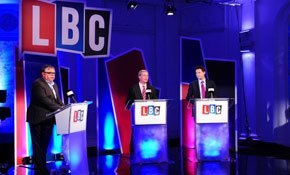John Humphrys asks: why did David Cameron and Ed Miliband not take part in the EU debate this week?
Nick Clegg and Nigel Farage battled it out on the airwaves this week. They’ll do it again next week. Never before have the euro-elections actually taken the issue of Europe so seriously. But where were the other leaders? And what does this public joust between leaders of the smaller parties mean for the way we do politics and elections in future?
We have got used to the elections for the European Parliament attracting little interest, less debate and derisory turnouts at the polls. The activity they generate is hardly ever about Europe. Instead, voters tend to use them as a way to register a protest, safe in the knowledge that the way they vote won’t actually affect the government of Britain. That may be why the BNP won some seats last time. For the established parties the elections constitute little more than a glorified opinion poll with a very large sample. Their response to the result is to say either that their victory shows they are on course to sweeping the country at the general election or that their defeat is neither here nor there. We yawn and move on to other things.
But this year it’s different, at least in one respect. By debating with each other, Nick Clegg, deputy prime minister and leader of the Liberal Democrats, and Nigel Farage, leader of UKIP, are making sure that what is supposed to be the central issue of the election is being fully aired: the future of the European Union and Britain’s place in it. They are also drawing attention to David Cameron and Ed Miliband. By their absence, they suggest, the leaders of the two biggest parties are trying to dodge the issue.
The audience for the first debate was over a million, respectable enough but not spectacular. Even so, the wider media coverage of it has been impressive and has concentrated many minds on the election.
The history of leaders’ debates on television is a fraught one. For years many people argued that, in an age when television had become so dominant, it was obvious that our political leaders should debate with each other in front of our eyes. Democracy demanded it and the example of the televised American presidential debates, which go back to the middle of the last century, made it seem absurd that we didn’t do the same.
But politicians had other ideas, or at least they did when it suited them. Old arguments, seemingly vested with all the hallowed authority of unbreakable constitutional propriety, were wheeled out. We were told that Parliament was the proper forum for political debate. Television studios seemed far too vulgar a place.
But in truth politicians’ attitudes were determined by their calculation of self-interest. In general, sitting prime ministers tended to be against debate because they didn’t want the uppity leader of the opposition to gain the advantage of seeming to share their statesmanlike elevation; uppity opposition leaders were eager to debate for just that reason. But even this calculation could be overturned by circumstance. In 1979,
Labour’s prime minister, the personally popular Jim Callaghan, was all for debating with his opponent - the ingénue, Margaret Thatcher - in order to try and show her up and so undermine the Conservatives’ poll lead. She, for that very reason, declined.
It was only at the last general election that it finally happened and so the precedent seemed to be set. Or was it? There are still politicians who think debating on television may be so harmful to their cause that reasons must be found to dodge them. Some Tory MPs, for example, think David Cameron made a fatal mistake when he agreed to take part in 2010. They reckon it cost their party a majority, for David Cameron because the inclusion of Nick Clegg gave the LibDems the fillip that made the difference.
The fact that neither David Cameron nor Ed Miliband is participating in the euro-election debates suggests that we have not yet reached the position where their presence is obligatory. Mr Cameron, responding to charges that he was ducking the argument, said:”I take part in debates every day of my life. I take part in a pretty lively debate every week at Prime Minister’s Questions. I go on radio and TV to make the case for my policies.”
Of course by agreeing to debate, Messrs Farage and Clegg are not exactly acting as saintly, disinterested democrats doing their duty irrespective of party interest. Both see it as very much in their interests. For Mr Farage it is a huge boost to UKIP for its leader, for the first time, to be treated on a par with other party leaders in televised debate. For Mr Clegg, it was an opportunity to show himself as a leader unafraid to advocate a position others fight shy of even when they share it.
The YouGov poll, immediately after the first debate, gave the laurels to Mr Farage. But the LibDems claim it has been very much to their advantage to have had the chance to rally their own supporters and give them a spring in their step. As one senior LibDem MP put it about his party’s unequivocal support for British membership of the EU, the party might as well be hung for a sheep as a lamb.
Whether the debates will lead people, for once, to decide their vote in the May euro-elections on the issue those elections are supposed to be about remains to be seen. Europe is low down on their list of concerns. But immigration, which relates in large part to our belonging to the EU, is very much a salient issue with voters at the moment, so the 2014 elections may buck the usual trend.
Certainly, for the parties, a lot hangs on the results. UKIP is hoping to top the poll, establishing it as a major force. Labour is determined to stop it and the Tories are desperate not to come third.
The chief importance of the election is what it says about the prospects for the parties at the general election just a year away. Once the euro-elections are over, party leaders will turn their attention fully to how their campaigns should be conducted. High on the agenda will be what to do about the leaders’ debates. And one of the questions they will have to answer is: should we invite Nigel?
- Are you watching the Clegg/Farage debates and, if so, what do you make of them?
- Will they affect how you vote in the euro-elections?
- Do you think it matters or not that David Cameron and Ed Miliband did not also debate?
- Whether or not you are watching the debates, will your vote (or indeed whether you bother to vote) be determined simply by issues to do with Europe or will other factors come into play?
- Do you think the party leaders should debate on television at the next election as they did at the last?
- And do you think UKIP’s leader should get an invitation too?










